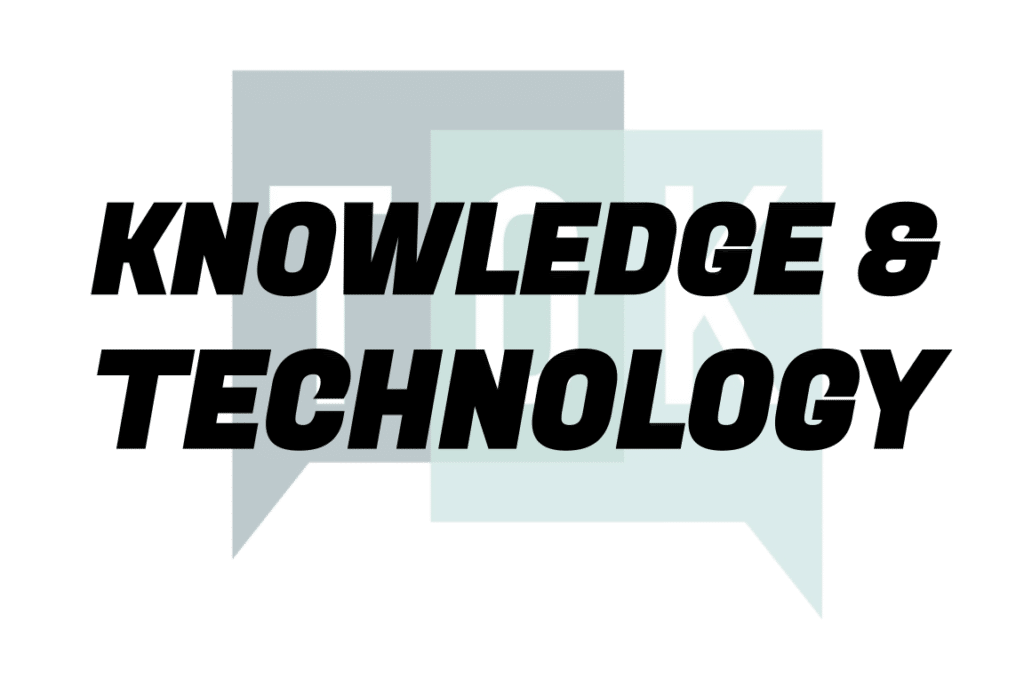
Welcome to the knowledge & technology section of the site. This page will help you to take ownership of technology via a quick overview, and four padlets that offer you quotes, knowledge questions, real-world issues, and key thinkers relating to this optional theme.
You can use this content both to understand this component of TOK, and support discussions and arguments that you offer in your essay and exhibition.
Knowledge & technology: a quick overview
The optional theme of knowledge & technology explores the relationship between technological advancements and the acquisition, interpretation, and dissemination of knowledge. It invites students to critically examine how technology shapes human understanding and the ethical responsibilities associated with its use.
Power emerges as a central concept, underscoring the profound influence that technology wields in shaping the way we access, control, and disseminate information. Perspective plays a crucial role, highlighting how different technological tools and platforms can influence our perceptions and interpretations of reality. The concept of responsibility raises important values-based questions about the ethical use of technology, including issues related to privacy, surveillance, and the impact of AI.
Two influential thinkers in the realm of knowledge and technology are Sherry Turkle and Tim Berners-Lee. Sherry Turkle, an American psychologist and author, has extensively explored the impact of technology on human relationships and identity, advocating for mindful and ethical use of digital tools.
Tim Berners-Lee, a British computer scientist, is credited with inventing the World Wide Web, revolutionizing the way information is accessed and shared, and championing principles of open access and a decentralized internet.
Contemporary issues related to knowledge and technology are so plentiful it’s hard to narrow them down. Discussions on digital privacy and surveillance raise questions about the balance between individual rights and national security in an era of pervasive digital monitoring. Additionally, debates on artificial intelligence and automation underscore the ethical implications of these technologies on employment, decision-making, and human autonomy.
Exploring knowledge & technology invites students to critically analyze the impact of technology on knowledge acquisition and dissemination, appreciate the potential and limitations of digital tools, and explore the ethical responsibilities associated with their use. It emphasizes the importance of digital literacy, ethical decision-making, and responsible digital citizenship in navigating the digital frontier.
1 QUOTES Who said “If you run from technology, it will chase you”?
Explore these quotes on technology by a wide range of different thinkers. Which quotes are the most and least insightful? How they challenge our assumptions about technology? What do they reveal about links between technology and other aspects of the TOK course?
2 KNOWLEDGE QUESTIONS Are algorithms free of biases?
Identifying and exploring knowledge questions (KQs) is at the heart of TOK, prompting us to reflect on our knowledge, evaluate whether it’s be based on a flawed or incomplete assumptions, and provide us with a focus point to improve our understanding of the world.
3 REAL-WORLD ISSUES Do AI girlfriends promote unhealthy relationships?
These examples will help you to understand how TOK ideas manifest in the real-world, take ownership of technology, link TOK to the latest global issues, and become an authentic critical thinker. They will also help you to justify and explore the discussions you offer in your essay and exhibition.
4 KEY THINKERS Have we returned to a pre-Copernican level of understanding?
The thinkers in this padlet will help you to consolidate your understanding of technology, and challenge your assumptions about the world. You can also draw on their ideas to support your essay and exhibition discussions, and add depth and authority to the claims you make about knowledge.

Subscribe to the free TOK newsletter!
Subscribe to our free newsletter, and collect fantastic examples to help you understand the key TOK ideas, support your essay and exhibition, and make you an authentic critical thinker.
You’ll encounter some of the most important thinkers from the past and the present, go beyond the headlines of contemporary events and issues around the globe, and see how TOK concepts manifest in the real-world. Subscribe HERE!